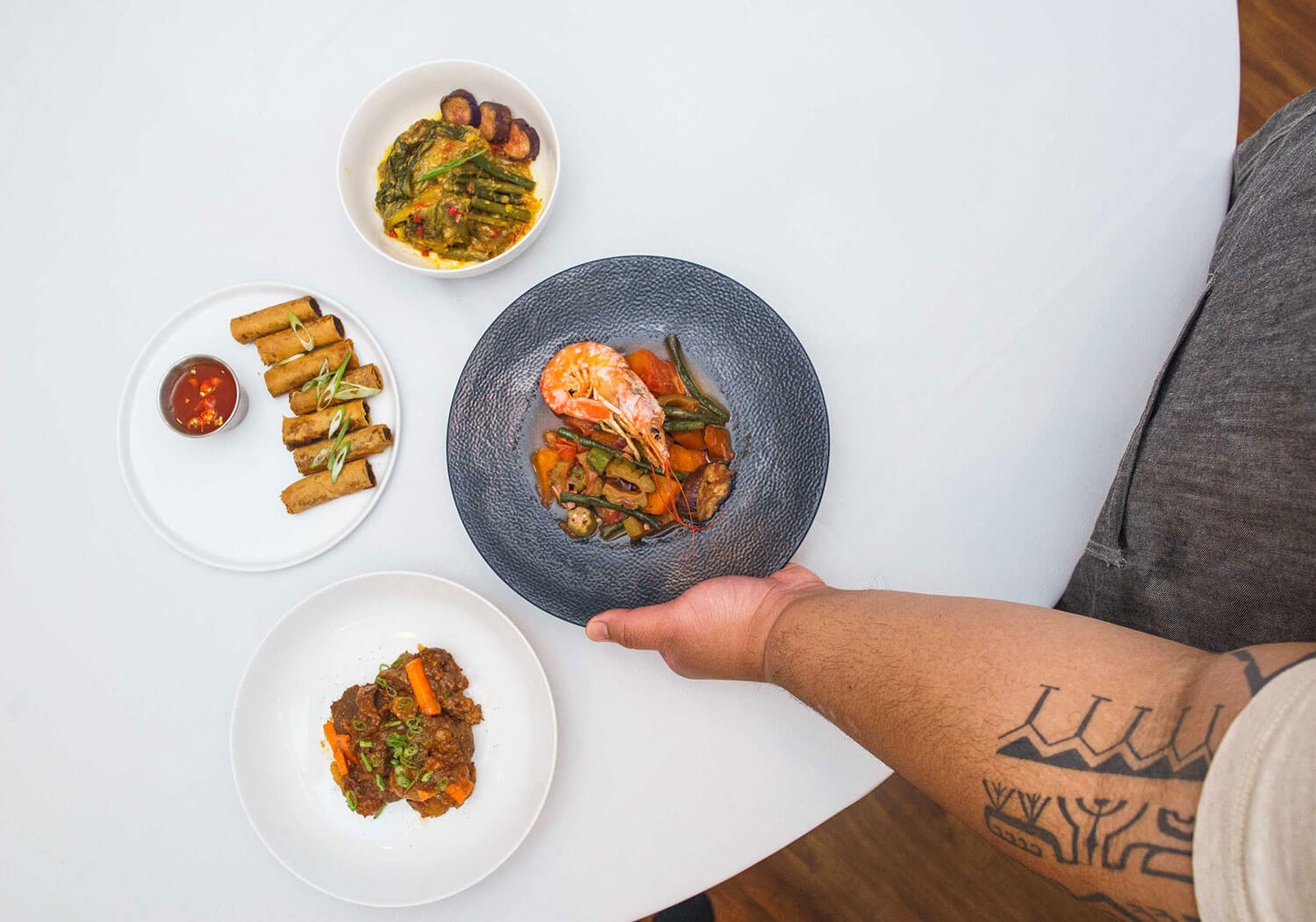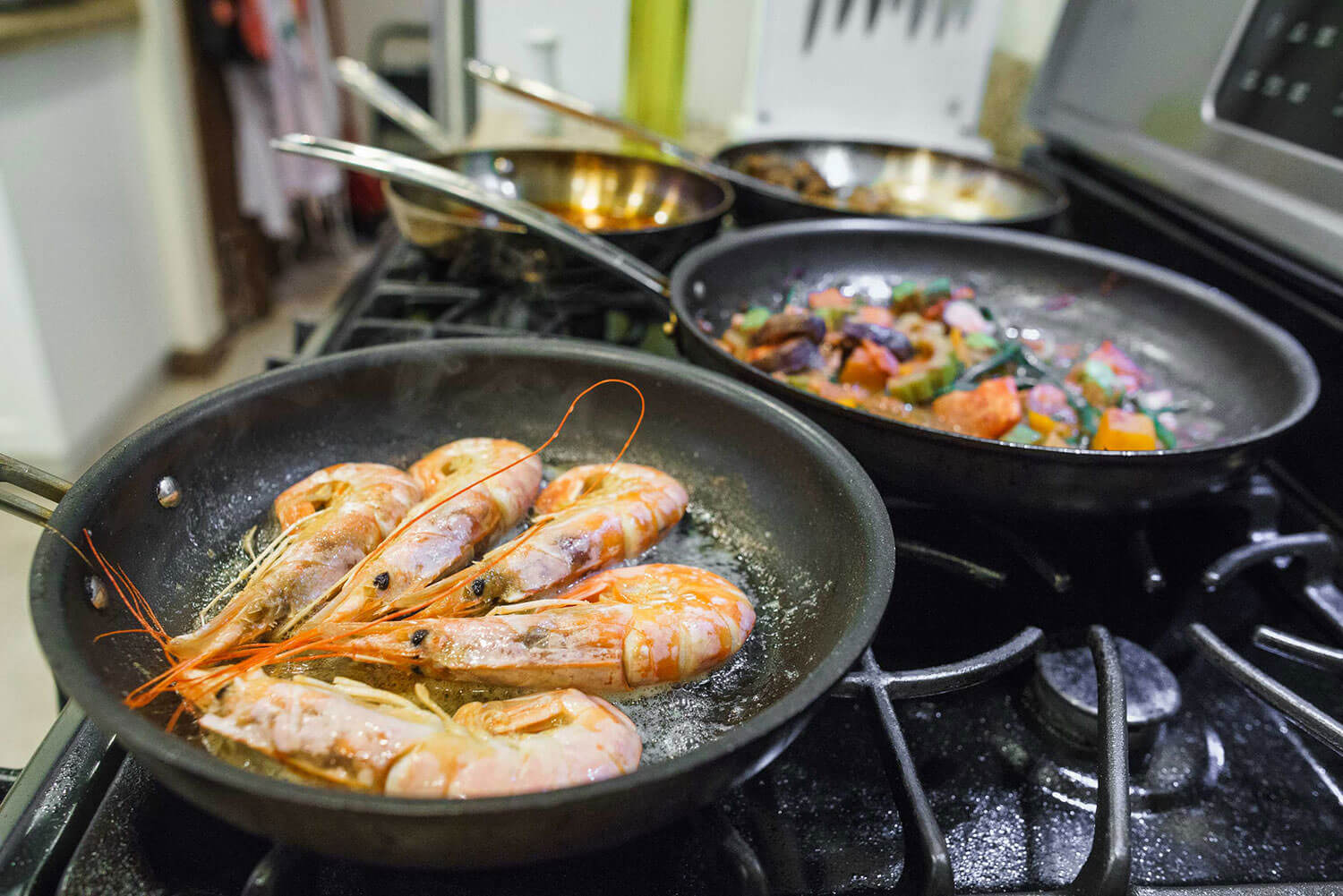
Even though I never learned how to speak any Filipinx languages, the names of everyday dishes like pancit and kaldareta roll off my tongue with relative ease. Some of my strongest memories are of me waiting for my mother in our car after she had spotted a malunggay tree in a neighbor’s yard. I would watch her run toward it with plastic bags, eager to pick the leaves for a stew later that week. Filipinx food was a cultural touchstone — one of the few real bonds I had to a country I had never lived in. Growing up in the United Arab Emirates, I saw my plate and the extended Filipinx family my parents had created as gentle reminders of my Filipinx-ness. Unlike in other spaces, I did not have to prove that identity to anyone when I was at the table. All I had to do was eat.
When I left home for college in Saint Paul, Minnesota, part of me worried that I would have less access to Filipinx food. And since I would be so far removed from other Filipinx, I would lose that connection to my roots. But I also wanted to explore different facets of my identity and was willing to put this particular angst on the back burner to make room. I started to latch onto broader collective identities like “international student” and “third culture kid”. They helped me find my strongest support system and life-giving friendships. On the other hand, identifying as one of a handful of scattered Filipinx and Filipinx Americans across campus felt incredibly lonely.

It was only in the summer between my junior and senior year that I intentionally picked that part of myself back up again. I spent a month and a half with a few other college students in a small barangay named Pajo just outside Manila in the Philippines, learning about incarnational ministry from church and neighborhood leaders. We were encouraged to practice being present, to pay attention to the world around us, and notice Christ. Christ in sudden rainfall on hot nights. In pandesal dipped in three-in-one coffee. In the lurch of a jeepney ride and the frailty of our bodies. In the unapologetic beauty of queer youth and their daily invitation to a roadside volleyball match. In the tender ache of our prayers. We asked ourselves where we saw God’s liberating, healing, and subversive presence. We made space for quiet revelation.
I had hoped that closing the physical gap between me and my parents’ homeland would help bridge the separation I felt within myself. Proximity changed my perspective, but not the way I thought it would. I learned more about the history of the Philippines. I lamented the systemic effects of Spanish, American, and Japanese occupations and their present-day manifestations. But I also grew more rooted in my identity as a daughter of the Filipinx diaspora, made in the image of God. As Faith Santilla put it in the song “Us” with Ruby Ibarra, Rocky Rivera, and Working Klass Klassy, “Your DNA contains building blocks made from the mud of over 500 years of resistance and survival.” My knowledge of my country’s and my kapwa’s resilience, and my love for who God created me to be as a Filipinx had expanded, but I could not shake the feeling that my longing for home would never be fully satisfied. This is why, when a friend recently asked me to tell him about a time when I felt most at home, I struggled to respond. After finally landing on a memory at a tiny Filipinx restaurant near the Columbia Heights neighborhood of Washington, D.C., I spoke up. “When I am in there — away from my siblings and parents and cousins — eating Filipinx food is as close as I’ll get.”
Despite Bad Saint’s 2017 ranking as the second best restaurant in the United States, I was anxious when I walked through its doors again. What if I don’t recognize the dishes they offered? What if the food here tastes nothing like the kind I helped my parents prepare growing up? I looked down at the menu. My mouth formed familiar syllables — the repeated ‘k’s and pronounced ‘o’s and generous ‘a’s. After talking briefly with the server, I ordered the adobong puso ng saging (banana hearts, tofu skin, black peppercorns), kinilaw (mackerel, ruby red grapefruit, coconut), and pyanggang manok (chicken, palapa, burnt coconut).

Every dish sang, each spoonful savory, rich, and warm. But it was the ampalaya (bitter melon) that undid me — the egg and diced tomatoes, the sour punch of suka (vinegar) and citrus. It reminded me of the way my mother cooked it in pinakbet (vegetable stew with shrimp paste), but the addition of preserved black bean made it new. The nutty rice cut through the bitterness of the ampalaya, which made its way to my tongue slowly and then all at once. It tasted like grief and strength and tenderness — the way you look back at a city as the plane takes off, the way my parents’ voices sound when they pray for me at the end of our weekly video calls, so many time zones apart.
It made me think of Eucharist — how receiving food and drink as simple as bread and wine can transform and nourish our bodies and spirits in ways we can’t fully understand, if we only let them. How those elements ground us in and help us celebrate who we are and to whom we belong.
In a 17-seat restaurant in northwest D.C., I cried over unexpected communion.
Distance, both physical and metaphysical, has reconstructed the way I experience Filipinx food. The rice and the bitter melon was a reminder of my mutual participation in and connection to a community across time and space. It stirred my heart toward diasporic heartache and love that always hopes for home. The simple act of eating holds space for grieving, remembering, and dreaming — for quiet revelation. It reminds me that when I am at the table, there is nothing to prove and no one to convince. I am home.

